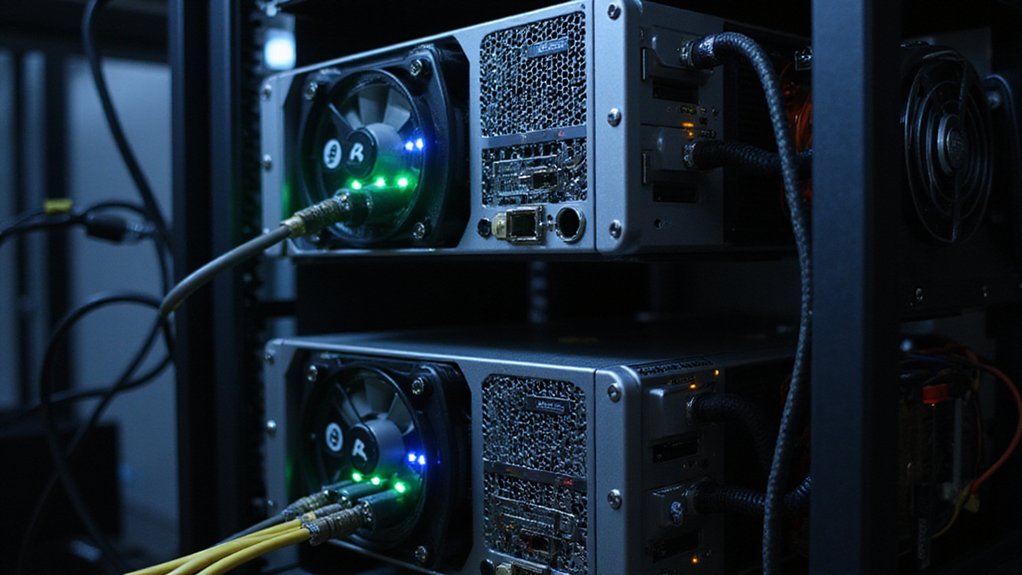Bitcoin mining exists in a global regulatory patchwork—legal in most jurisdictions yet variously embraced or constrained. The United States, Canada, and Australia generally permit operations under existing financial frameworks, while certain regions impose outright bans citing energy consumption concerns or potential illicit flows. Economic implications range from job creation to substantial investment, though profitability remains tethered to Bitcoin’s valuation and local electricity costs. The sustainability question looms large as miners navigate this complex legal landscape.

Where exactly does Bitcoin mining fall on the global regulatory spectrum?
The answer, not unlike Bitcoin’s notorious price chart, varies dramatically depending on where one plants one’s digital flag.
This decentralized computational endeavor—simultaneously praised as financial innovation and derided as environmental catastrophe—exists in a regulatory patchwork that defies simple categorization.
In most jurisdictions, Bitcoin mining remains perfectly legal, albeit with varying degrees of regulatory enthusiasm.
The United States and Canada have generally embraced mining operations, though with notable provincial variations in the latter (Quebec’s relationship with miners has been particularly tempestuous). In the U.S., entities involved in Bitcoin activities are classified as money services businesses and must comply with the Bank Secrecy Act requirements.
Australia applies existing commercial frameworks rather than crafting bespoke legislation, while European nations have constructed nuanced regulatory approaches that acknowledge both economic potential and environmental concerns. In the European Union, cryptocurrency transactions remain VAT/GST exempt, creating a favorable tax environment for mining operations.
The calculus changes dramatically, however, in regions where cryptocurrency mining faces outright prohibition.
These bans typically stem from two primary concerns: strain on energy infrastructure and potential facilitation of illicit financial flows.
The irony that an innovation designed to circumvent centralized control now faces its greatest opposition from centralized authorities is not lost on industry observers.
Economic implications of these legal frameworks cannot be overstated.
Where mining flourishes legally, it creates job opportunities and attracts substantial investment—though profitability remains tethered to Bitcoin’s notoriously fickle valuation and local electricity costs. Successful miners typically use specialized ASIC miners that offer optimal computational power for the task of Bitcoin mining.
The environmental question looms large over these economic considerations; Bitcoin’s energy appetite has triggered legitimate sustainability concerns that influence regulatory postures worldwide.
Technological advancement may ultimately render some regulatory concerns obsolete.
Efficiency improvements in mining hardware, integration of renewable energy sources, and potential blockchain protocol modifications could substantially reduce the ecological footprint that provokes governmental scrutiny.
Innovative cooling technologies and sustainability initiatives further suggest that tomorrow’s mining operations might bear little resemblance to today’s energy-intensive enterprises.
For prospective miners, maneuvering this complex legal terrain requires due diligence and recognition that today’s permissive jurisdiction might become tomorrow’s regulatory battleground.¹
—
¹ Particularly as climate concerns intensify globally.
Frequently Asked Questions
How Much Electricity Does Bitcoin Mining Typically Consume?
Bitcoin mining consumes approximately 120 TWh of electricity annually, though estimates range from 67 TWh to 240 TWh.
This consumption represents roughly 0.5% of global energy use and equates to the entire electricity usage of countries like Greece or Australia.
For perspective, Bitcoin’s energy appetite exceeds Google’s global operations sevenfold and consumes about 2% of the electricity used by the United States—a remarkably substantial footprint for a digital currency that exists primarily in the ether.
What Hardware Is Required to Start Mining Bitcoin?
To start Bitcoin mining, one requires specialized ASIC (Application-Specific Integrated Circuit) miners—devices like the Bitmain Antminer S21 Pro or MicroBT Whatsminer M66S that offer superior hashrates.
While CPUs and GPUs technically *can* mine Bitcoin, they’ve become woefully inadequate for profitable operations.
Additionally, miners need reliable internet connectivity, proper cooling systems, mining software, and a Bitcoin wallet.
The initial investment isn’t trivial; effective hardware packages begin in the thousands of dollars—a considerable barrier to entry.
Is Bitcoin Mining Profitable for Individual Miners Today?
Individual Bitcoin mining profitability remains precarious at best, contingent upon a constellation of variables including energy costs, hardware efficiency, and Bitcoin’s notoriously capricious price movements.
While technological advancements have yielded more efficient ASIC miners, the economics still favor large-scale operations with access to subsidized electricity¹.
Home miners might achieve marginal profitability in specific circumstances—particularly in regions with dirt-cheap energy—but most individual enthusiasts would find their mining ventures underwater after factoring in equipment depreciation and operational costs.
¹As previously discussed, equipment requirements constitute a significant barrier to entry.
How Does Bitcoin Mining Impact the Environment?
Bitcoin mining exacts a substantial environmental toll, primarily through its voracious energy consumption.
The process—which relies heavily on coal (45% of mining electricity)—generated approximately 85.89 Mt of carbon dioxide in 2020-2021, contributing nearly 1% to global emissions.
Beyond carbon concerns, mining operations strain local power grids, deplete water resources, and increase PM2.5 air pollution in surrounding communities.
While technological advancements and renewable energy shifts offer potential remedies, the industry’s current trajectory remains environmentally problematic.
Can I Mine Bitcoin Using My Home Computer?
*Not to mention the cacophonous fan noise that transforms living spaces into miniature data centers.









